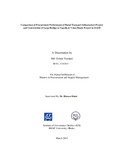| dc.contributor.advisor | Dr. Rizwan Khair | |
| dc.contributor.author | Yazdani, Md. Golam | |
| dc.date.accessioned | 2014-01-08T08:30:32Z | |
| dc.date.available | 2014-01-08T08:30:32Z | |
| dc.date.copyright | 2013 | |
| dc.date.issued | 2013-03 | |
| dc.identifier.other | ID 13182013 | |
| dc.identifier.uri | http://hdl.handle.net/10361/2804 | |
| dc.description | This dissertation report is submitted in partial fulfillment of the requirements for the degree of Masters in Procurement and Supply Management, 2013. | en_US |
| dc.description | Cataloged from PDF version of thesis report. | |
| dc.description | Includes bibliographical references (page 30). | |
| dc.description.abstract | Bangladesh is a developing country. Until 2003, the country belonged no standard
procurement rules and procedures. In 2003, by World Bank’s initiatives, Government of
Bangladesh has made a revolution through introducing Public Procurement Regulation
(PPR) 2003 which was legitimated in 2006 as Public Procurement Act (PPA) 2006 and
Public Procurement Rules (PPR) 2008. The objectives of this research work intends assessment and compare performance of procurement process between two projects RTIP and LBC project of LGED and identify the factors which impact the performance of procurement and also suggest for improvement in procurement process.
The main research questions are what factors which affect on performance of
procurement and is there any difference in performance of procurement between GOB
project and donor funded project? The methodology of this study to undertake (i) review of Procurement Guidelines of World Bank and PPR,2008 and PPA,2006; (ii) Key informants interviews, (iii) Questionnaire survey for primary data and (iii) Secondary Data collection from project offices . A questionnaire survey has been conducted in LGED for collection secondary data. The questionnaire has 13 close questions and 2 open questions. About 30 respondents responded this questionnaire. Secondary data collected from respective project files/records on the basis of 10 performance indicators (PI). 20 contracts have been selected from each project. The findings of this study are as following: There are many factors which affect the performance of procurement. These are lack of knowledge and commitment of different stakeholders, vast tender document, lack of ethical standard. Political influence and fund crisis are also barriers for procurement performance. Moreover PPR’2008 brings discipline and uniformity in public procurement. For the above findings some recommendations given below:
Introduce training to increase knowledge and commitment of different stakeholders. A
fit list may be prepared for posting a focal person for Procurement purpose in each
project. Adapting a communication campaign for behavioral and attitude change for
various groups of society, especially for political leaders, media persons. Introduce
incentive/disincentive mechanism (reward and punishment) by initiating punitive actions
for bad performance and reward for good performance. Introduce electronic government
procurement (e-GP) in LGED. This is ensuring transparency and reducing unwanted
disturbance. | en_US |
| dc.description.statementofresponsibility | Md. Golam Yazdani | |
| dc.format.extent | 33 pages | |
| dc.language.iso | en | en_US |
| dc.publisher | BRAC University | en_US |
| dc.rights | BRAC University dissertation reports are protected by copyright. They may be viewed from this source for any purpose, but reproduction or distribution in any format is prohibited without written permission. | |
| dc.subject | Procurement and supply management | |
| dc.title | Comparison of procurement performance of rural transport infrastucture project and construction of large bridge on upazila & union Roads project in LGED | en_US |
| dc.type | Dissertation | en_US |
| dc.contributor.department | Institute of Governance Studies, BRAC University | |
| dc.description.degree | M. Procurement and Supply Management | |

